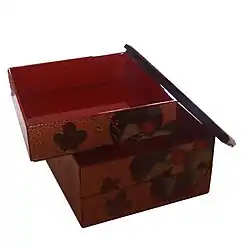重箱
Japanese

重箱 (jūbako, rare reading: kasanebako): square jūbako with lid.

重箱 (jūbako, rare reading: kasanebako): hexagonal jūbako used to serve food.
Etymology 1
| Kanji in this term | |
|---|---|
| 重 | 箱 |
| かさ(ね) Grade: 3 |
はこ > ばこ Grade: 3 |
| kun’yomi | |
From Old Japanese. Compound of 重ね (kasane, “a pile, a tier, a ply”) + 箱 (hako, “a box”). The hako changes to bako as an instance of rendaku (連濁).
This reading appears to be rare.
Noun
重箱 (hiragana かさねばこ, rōmaji kasanebako)
Etymology 2
| Kanji in this term | |
|---|---|
| 重 | 箱 |
| じゅう Grade: 3 |
はこ > ばこ Grade: 3 |
| jūbakoyomi | |
Origin less clear. Chinese-derived on'yomi 重 (jū, “to stack”) + Old Japanese 箱 (hako, “box”). The hako changes to bako as an instance of rendaku (連濁).
This is the standard reading for this term.
Noun
重箱 (hiragana じゅうばこ, rōmaji jūbako, historical hiragana ぢゆうばこ)
Idioms
Idioms
- 重箱で味噌を擂る (jūbako de miso o suru): “grind miso in a jūbako” → don't sweat the small stuff; excellent appearance, but inappropriate to the task at hand
- 重箱に鍋蓋 (jūbako ni nabebuta): “a pot-lid on a jūbako” → a square peg into a round hole
- 重箱に煮染め (jūbako ni nishime): “boiled stew in a jūbako” → looks great on the outside, not so good on the inside: appearances can be deceiving
- 重箱の隅を杓子で払え (jūbako no sumi o shakushi de harae): “clear out the corners of a jūbako with a ladle” → to see the forest for the trees, don't sweat the small stuff
- 重箱の隅を楊枝でほじくる (jūbako no sumi o yōji de hojikuru): “to pick out the corners of a jūbako with a toothpick” → to split hairs
- 重箱を擂り粉木で洗う (jūbako o surikogi de arau): “clean a jūbako with a pestle” → see the forest for the trees, don't sweat the small stuff
Derived terms
This article is issued from Wiktionary. The text is licensed under Creative Commons - Attribution - Sharealike. Additional terms may apply for the media files.